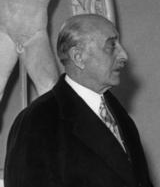| |||||||||||||||||||||||||||||||||||||||||||||||||||||||||||||||||
All 354 seats of the Greek Parliament 178 seats were needed for a majority | |||||||||||||||||||||||||||||||||||||||||||||||||||||||||||||||||
|---|---|---|---|---|---|---|---|---|---|---|---|---|---|---|---|---|---|---|---|---|---|---|---|---|---|---|---|---|---|---|---|---|---|---|---|---|---|---|---|---|---|---|---|---|---|---|---|---|---|---|---|---|---|---|---|---|---|---|---|---|---|---|---|---|---|
| |||||||||||||||||||||||||||||||||||||||||||||||||||||||||||||||||
| |||||||||||||||||||||||||||||||||||||||||||||||||||||||||||||||||
 |
|---|
| This article is part of a series on the politics and government of Greece |
Parliamentary elections were held in Greece on 31 March 1946. [1] The result was a victory for the United Alignment of Nationalists, an alliance that included the People's Party, the National Liberal Party, the Reform Party, [2] which won 206 of the 354 seats in Parliament. [3] As a result Konstantinos Tsaldaris became Prime Minister leading a right-wing coalition. Nonetheless, he soon decided to resign in favor of Themistoklis Sophoulis, who led a government of national unity (conservative and centre-liberal forces) during the entire second phase of the civil war (1946–1949). One of the priorities of the new government was the proclamation of a plebiscite for the restoration of the Greek monarchy.

Greece, officially the Hellenic Republic, self-identified and historically known as Hellas, is a country located in Southern and Southeast Europe, with a population of approximately 11 million as of 2016. Athens is the nation's capital and largest city, followed by Thessaloniki.
The United Alignment of Nationalists was a right-wing political alliance in Greece formed to contest the 1946 elections. It consisted of the People's Party, the National Liberal Party, the Reformist Party, the Royalist Party, the Panhellenic National Party, the Patriotic Union Party the Forward Political Group, the Party of Reconstruction and the Social Radical Union.
The People's Party was a conservative and pro-monarchist Greek political party founded by Dimitrios Gounaris, the main political rival of Eleftherios Venizelos and his Liberal Party. The party existed from 1920 until 1958.
The elections were marked by the boycott of the Communist Party of Greece claiming in protest against the unfolding, state-tolerated White Terror against the former members of EAM-ELAS. The night before the elections, a communist band attacked a police station in Litochoro. This event is considered the beginning of the three years civil war.

The Communist Party of Greece is a Marxist–Leninist political party in Greece. Founded in 1918 as the Socialist Labour Party of Greece, it is the oldest political party in modern Greek politics. The party played a significant role in the Greek resistance and its membership peaked in the mid-1940s. It was the instigator of the Greek Civil War, but ended on the losing side and was banned until 1974.
White Terror is the term used in Greece, analogous to similar cases, for the period of persecution of members of the Communist Party of Greece (KKE) and other former members of the leftist World War II-era resistance organization National Liberation Front (EAM) in 1945–46, prior to the outbreak of the Greek Civil War.

Litochoro is a town and a former municipality in the southern part of the Pieria regional unit, Greece. Since the 2011 local government reform it has been part of the Dio-Olympos municipality, of which it is the seat and a municipal unit. It is located at the base of Mount Olympus, on the western shore of the Thermaic Gulf. The first recorded mention of Litochoro is in an account of a visit by Saint Dionysius to Mount Olympus in the 16th century. The town is a popular destination for those wishing to climb Mount Olympus as almost all climbing routes begin to the southwest of the town. A famous son of the town was Christos Kakkalos, who ascended first Mount Olympos in 1913.
One of the reasons for the defeat of the centre-liberal parties was the division of the Liberal Party, founded by Eleftherios Venizelos. One faction remained loyal to the leadership of Themistoklis Sophoulis, while another faction followed Sophoklis Venizelos, who formed a coalition with Georgios Papandreou and Panayiotis Kanellopoulos.
The Liberal Party, also the National Progressive Centre Union since 1952, was a major political party in Greece during the early-to-mid 20th century. It was founded in August 1910 by Eleftherios Venizelos and went on to dominate Greek politics for a considerable number of years until its decline following the Second World War. Among its most well-known members, apart from Venizelos, were Alexandros Papanastasiou, Nikolaos Plastiras, Georgios Papandreou and Konstantinos Mitsotakis.

Eleftherios Kyriakou Venizelos was an eminent Greek leader of the Greek national liberation movement and a charismatic statesman of the early 20th century, remembered for his contribution in the expansion of Greece and promotion of liberal-democratic policies. As leader of the Liberal Party, he was elected several times, in total eight, as Prime Minister of Greece, serving from 1910 to 1920 and from 1928 to 1933. Venizelos had such profound influence on the internal and external affairs of Greece that he is credited with being "the maker of modern Greece", and is still widely known as the "Ethnarch".










